Strategies for Quality Management in Engineering Tooling Company
VerifiedAdded on 2023/01/09
|11
|3876
|69
Report
AI Summary
This report provides a comprehensive analysis of quality management strategies employed by Engineering Tooling to achieve organisational excellence. It begins with an introduction to quality management and its significance in ensuring customer satisfaction and loyalty, particularly within a competitive global market. The main body of the report delves into the specific tactics used by Engineering Tooling, including Total Quality Management (TQM), quality assurance, and quality control. TQM is examined as a structured approach focusing on continuous improvement and employee involvement, while quality assurance is presented as a process that guarantees the delivery of valuable products through techniques such as product testing and adherence to standards. Quality control is then discussed as a strategy for closely supervising each step of the manufacturing process to minimise errors and waste. The report concludes with recommendations on how the company can further improve its quality management practices and attract new customers. The report is structured with an introduction, main body, and recommendations with references.
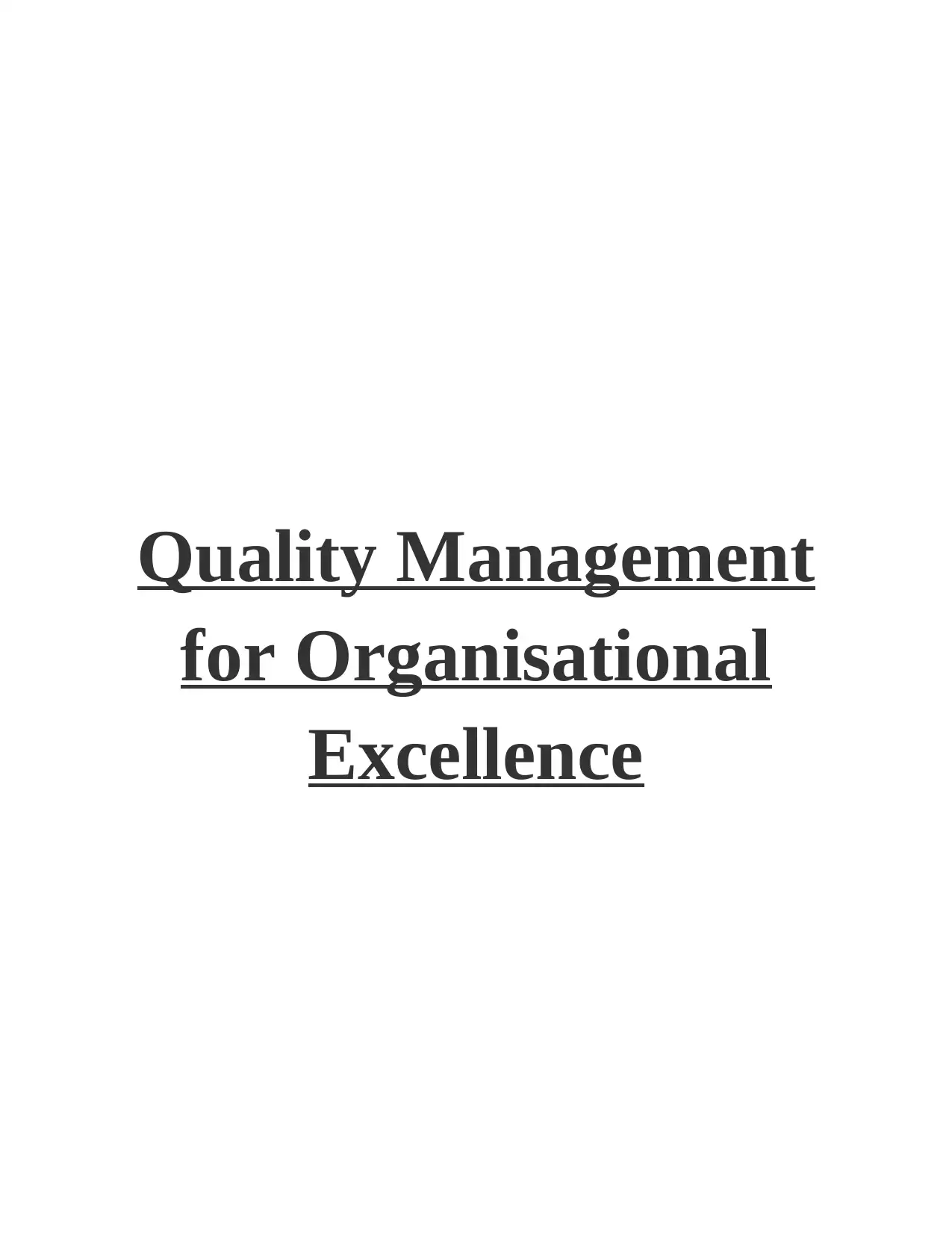
Quality Management
for Organisational
Excellence
for Organisational
Excellence
Paraphrase This Document
Need a fresh take? Get an instant paraphrase of this document with our AI Paraphraser
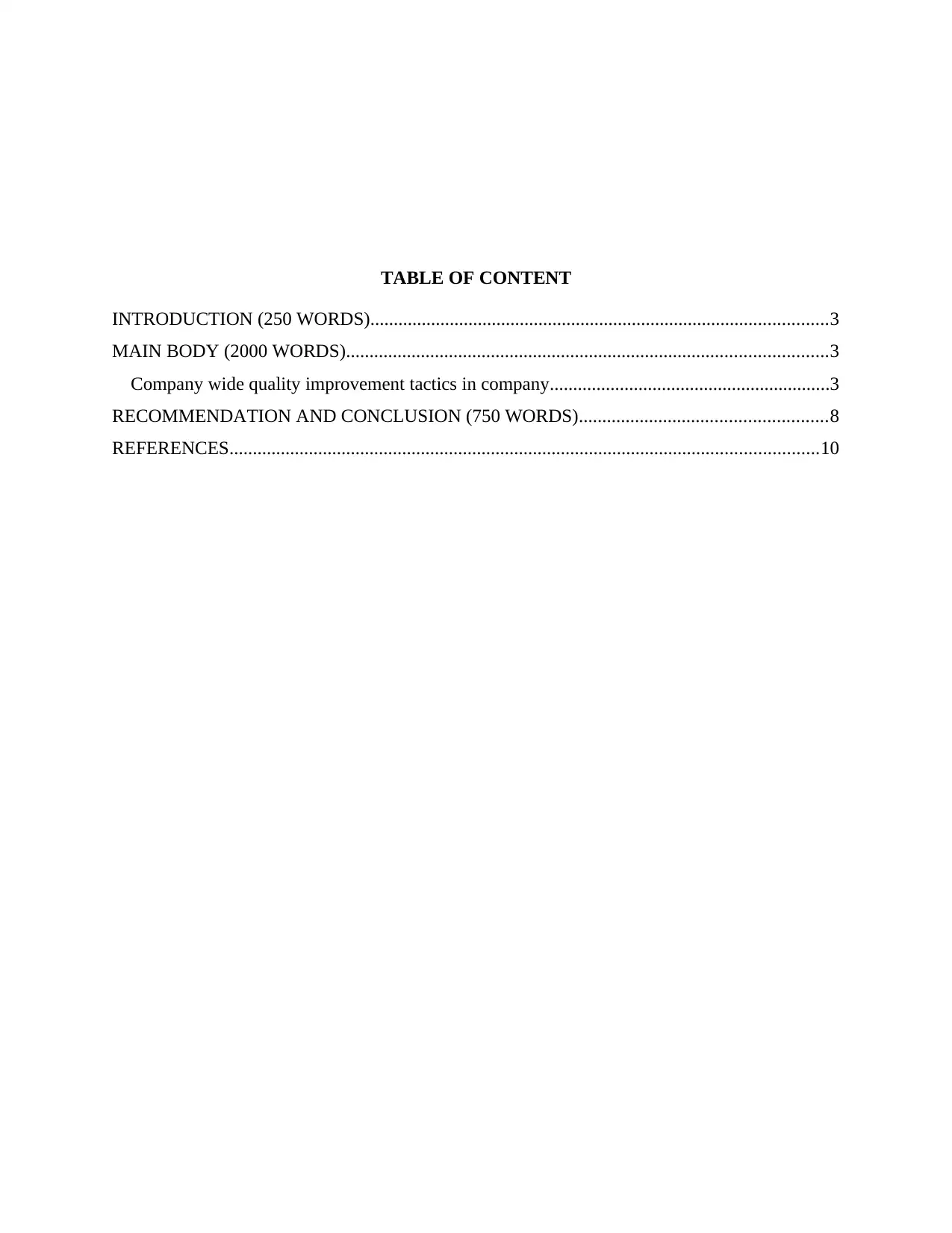
TABLE OF CONTENT
INTRODUCTION (250 WORDS)..................................................................................................3
MAIN BODY (2000 WORDS).......................................................................................................3
Company wide quality improvement tactics in company............................................................3
RECOMMENDATION AND CONCLUSION (750 WORDS).....................................................8
REFERENCES..............................................................................................................................10
INTRODUCTION (250 WORDS)..................................................................................................3
MAIN BODY (2000 WORDS).......................................................................................................3
Company wide quality improvement tactics in company............................................................3
RECOMMENDATION AND CONCLUSION (750 WORDS).....................................................8
REFERENCES..............................................................................................................................10
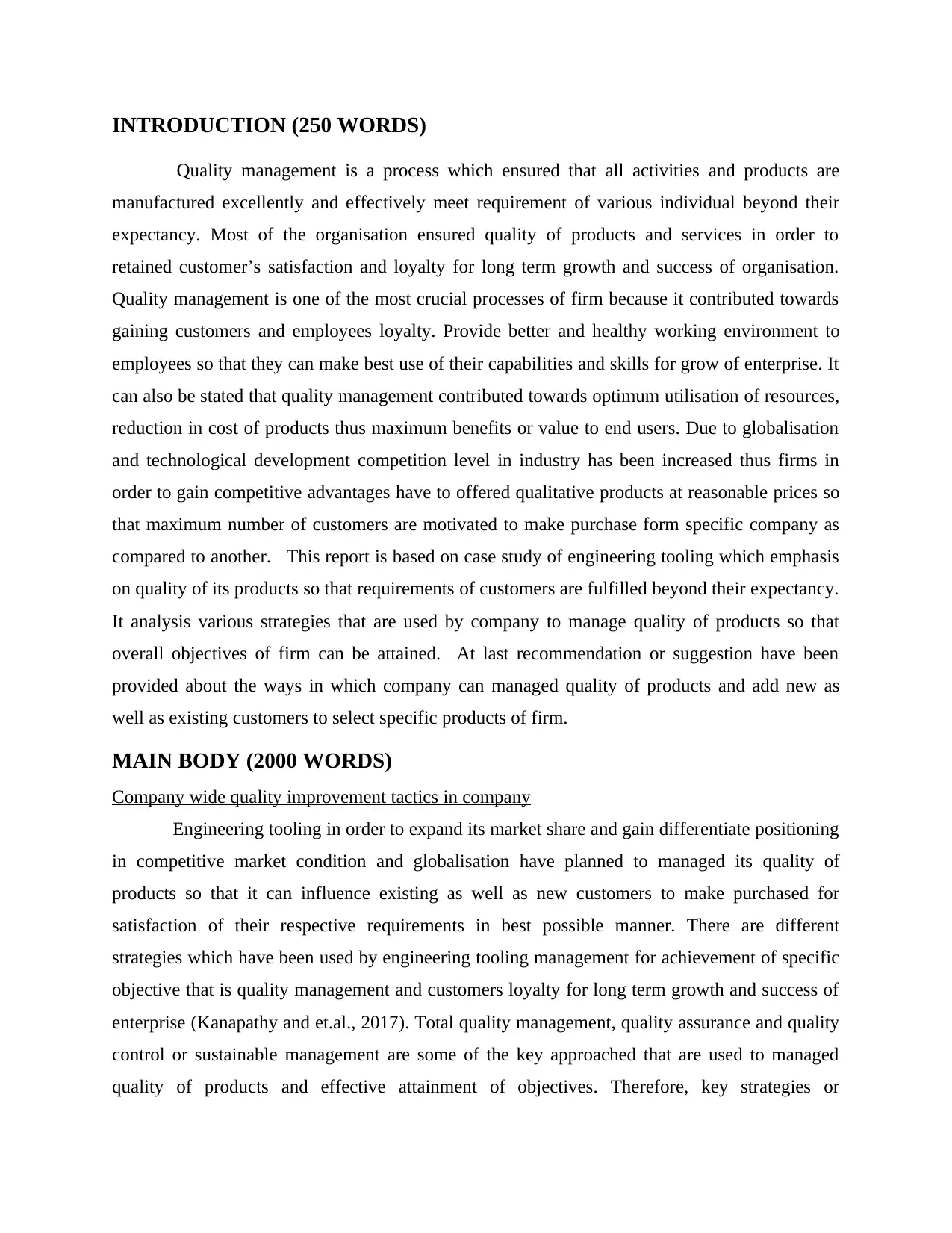
INTRODUCTION (250 WORDS)
Quality management is a process which ensured that all activities and products are
manufactured excellently and effectively meet requirement of various individual beyond their
expectancy. Most of the organisation ensured quality of products and services in order to
retained customer’s satisfaction and loyalty for long term growth and success of organisation.
Quality management is one of the most crucial processes of firm because it contributed towards
gaining customers and employees loyalty. Provide better and healthy working environment to
employees so that they can make best use of their capabilities and skills for grow of enterprise. It
can also be stated that quality management contributed towards optimum utilisation of resources,
reduction in cost of products thus maximum benefits or value to end users. Due to globalisation
and technological development competition level in industry has been increased thus firms in
order to gain competitive advantages have to offered qualitative products at reasonable prices so
that maximum number of customers are motivated to make purchase form specific company as
compared to another. This report is based on case study of engineering tooling which emphasis
on quality of its products so that requirements of customers are fulfilled beyond their expectancy.
It analysis various strategies that are used by company to manage quality of products so that
overall objectives of firm can be attained. At last recommendation or suggestion have been
provided about the ways in which company can managed quality of products and add new as
well as existing customers to select specific products of firm.
MAIN BODY (2000 WORDS)
Company wide quality improvement tactics in company
Engineering tooling in order to expand its market share and gain differentiate positioning
in competitive market condition and globalisation have planned to managed its quality of
products so that it can influence existing as well as new customers to make purchased for
satisfaction of their respective requirements in best possible manner. There are different
strategies which have been used by engineering tooling management for achievement of specific
objective that is quality management and customers loyalty for long term growth and success of
enterprise (Kanapathy and et.al., 2017). Total quality management, quality assurance and quality
control or sustainable management are some of the key approached that are used to managed
quality of products and effective attainment of objectives. Therefore, key strategies or
Quality management is a process which ensured that all activities and products are
manufactured excellently and effectively meet requirement of various individual beyond their
expectancy. Most of the organisation ensured quality of products and services in order to
retained customer’s satisfaction and loyalty for long term growth and success of organisation.
Quality management is one of the most crucial processes of firm because it contributed towards
gaining customers and employees loyalty. Provide better and healthy working environment to
employees so that they can make best use of their capabilities and skills for grow of enterprise. It
can also be stated that quality management contributed towards optimum utilisation of resources,
reduction in cost of products thus maximum benefits or value to end users. Due to globalisation
and technological development competition level in industry has been increased thus firms in
order to gain competitive advantages have to offered qualitative products at reasonable prices so
that maximum number of customers are motivated to make purchase form specific company as
compared to another. This report is based on case study of engineering tooling which emphasis
on quality of its products so that requirements of customers are fulfilled beyond their expectancy.
It analysis various strategies that are used by company to manage quality of products so that
overall objectives of firm can be attained. At last recommendation or suggestion have been
provided about the ways in which company can managed quality of products and add new as
well as existing customers to select specific products of firm.
MAIN BODY (2000 WORDS)
Company wide quality improvement tactics in company
Engineering tooling in order to expand its market share and gain differentiate positioning
in competitive market condition and globalisation have planned to managed its quality of
products so that it can influence existing as well as new customers to make purchased for
satisfaction of their respective requirements in best possible manner. There are different
strategies which have been used by engineering tooling management for achievement of specific
objective that is quality management and customers loyalty for long term growth and success of
enterprise (Kanapathy and et.al., 2017). Total quality management, quality assurance and quality
control or sustainable management are some of the key approached that are used to managed
quality of products and effective attainment of objectives. Therefore, key strategies or
⊘ This is a preview!⊘
Do you want full access?
Subscribe today to unlock all pages.

Trusted by 1+ million students worldwide
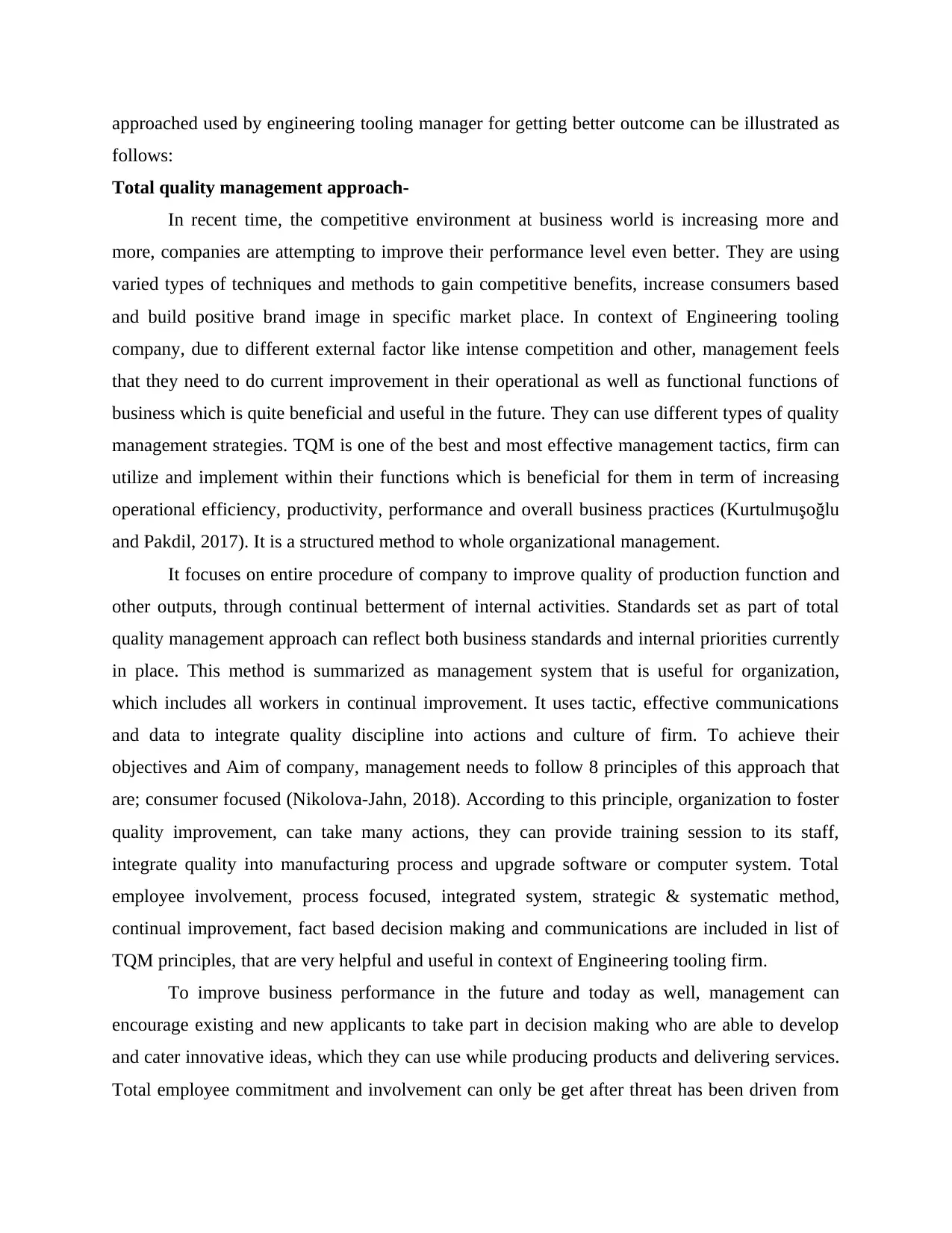
approached used by engineering tooling manager for getting better outcome can be illustrated as
follows:
Total quality management approach-
In recent time, the competitive environment at business world is increasing more and
more, companies are attempting to improve their performance level even better. They are using
varied types of techniques and methods to gain competitive benefits, increase consumers based
and build positive brand image in specific market place. In context of Engineering tooling
company, due to different external factor like intense competition and other, management feels
that they need to do current improvement in their operational as well as functional functions of
business which is quite beneficial and useful in the future. They can use different types of quality
management strategies. TQM is one of the best and most effective management tactics, firm can
utilize and implement within their functions which is beneficial for them in term of increasing
operational efficiency, productivity, performance and overall business practices (Kurtulmuşoğlu
and Pakdil, 2017). It is a structured method to whole organizational management.
It focuses on entire procedure of company to improve quality of production function and
other outputs, through continual betterment of internal activities. Standards set as part of total
quality management approach can reflect both business standards and internal priorities currently
in place. This method is summarized as management system that is useful for organization,
which includes all workers in continual improvement. It uses tactic, effective communications
and data to integrate quality discipline into actions and culture of firm. To achieve their
objectives and Aim of company, management needs to follow 8 principles of this approach that
are; consumer focused (Nikolova-Jahn, 2018). According to this principle, organization to foster
quality improvement, can take many actions, they can provide training session to its staff,
integrate quality into manufacturing process and upgrade software or computer system. Total
employee involvement, process focused, integrated system, strategic & systematic method,
continual improvement, fact based decision making and communications are included in list of
TQM principles, that are very helpful and useful in context of Engineering tooling firm.
To improve business performance in the future and today as well, management can
encourage existing and new applicants to take part in decision making who are able to develop
and cater innovative ideas, which they can use while producing products and delivering services.
Total employee commitment and involvement can only be get after threat has been driven from
follows:
Total quality management approach-
In recent time, the competitive environment at business world is increasing more and
more, companies are attempting to improve their performance level even better. They are using
varied types of techniques and methods to gain competitive benefits, increase consumers based
and build positive brand image in specific market place. In context of Engineering tooling
company, due to different external factor like intense competition and other, management feels
that they need to do current improvement in their operational as well as functional functions of
business which is quite beneficial and useful in the future. They can use different types of quality
management strategies. TQM is one of the best and most effective management tactics, firm can
utilize and implement within their functions which is beneficial for them in term of increasing
operational efficiency, productivity, performance and overall business practices (Kurtulmuşoğlu
and Pakdil, 2017). It is a structured method to whole organizational management.
It focuses on entire procedure of company to improve quality of production function and
other outputs, through continual betterment of internal activities. Standards set as part of total
quality management approach can reflect both business standards and internal priorities currently
in place. This method is summarized as management system that is useful for organization,
which includes all workers in continual improvement. It uses tactic, effective communications
and data to integrate quality discipline into actions and culture of firm. To achieve their
objectives and Aim of company, management needs to follow 8 principles of this approach that
are; consumer focused (Nikolova-Jahn, 2018). According to this principle, organization to foster
quality improvement, can take many actions, they can provide training session to its staff,
integrate quality into manufacturing process and upgrade software or computer system. Total
employee involvement, process focused, integrated system, strategic & systematic method,
continual improvement, fact based decision making and communications are included in list of
TQM principles, that are very helpful and useful in context of Engineering tooling firm.
To improve business performance in the future and today as well, management can
encourage existing and new applicants to take part in decision making who are able to develop
and cater innovative ideas, which they can use while producing products and delivering services.
Total employee commitment and involvement can only be get after threat has been driven from
Paraphrase This Document
Need a fresh take? Get an instant paraphrase of this document with our AI Paraphraser
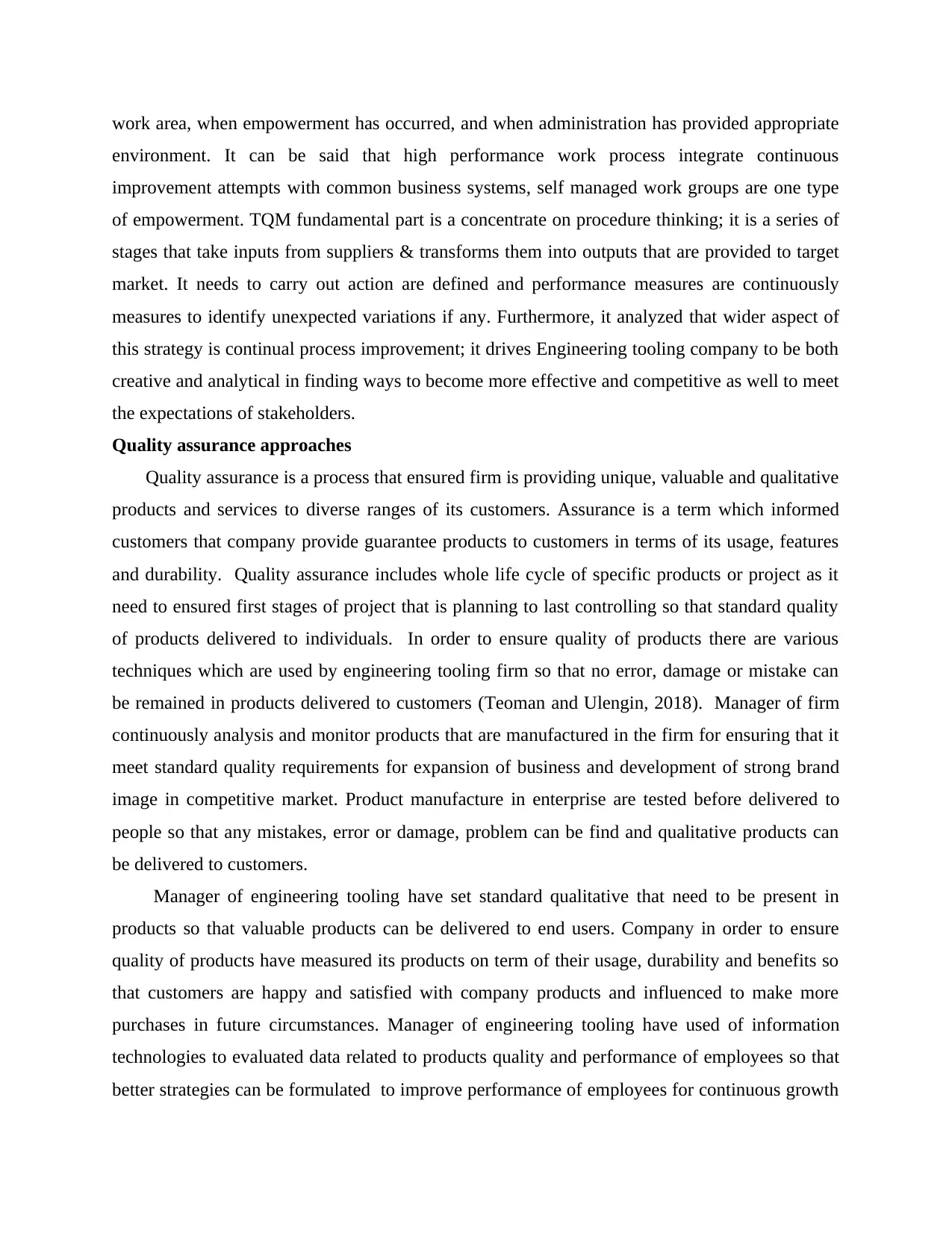
work area, when empowerment has occurred, and when administration has provided appropriate
environment. It can be said that high performance work process integrate continuous
improvement attempts with common business systems, self managed work groups are one type
of empowerment. TQM fundamental part is a concentrate on procedure thinking; it is a series of
stages that take inputs from suppliers & transforms them into outputs that are provided to target
market. It needs to carry out action are defined and performance measures are continuously
measures to identify unexpected variations if any. Furthermore, it analyzed that wider aspect of
this strategy is continual process improvement; it drives Engineering tooling company to be both
creative and analytical in finding ways to become more effective and competitive as well to meet
the expectations of stakeholders.
Quality assurance approaches
Quality assurance is a process that ensured firm is providing unique, valuable and qualitative
products and services to diverse ranges of its customers. Assurance is a term which informed
customers that company provide guarantee products to customers in terms of its usage, features
and durability. Quality assurance includes whole life cycle of specific products or project as it
need to ensured first stages of project that is planning to last controlling so that standard quality
of products delivered to individuals. In order to ensure quality of products there are various
techniques which are used by engineering tooling firm so that no error, damage or mistake can
be remained in products delivered to customers (Teoman and Ulengin, 2018). Manager of firm
continuously analysis and monitor products that are manufactured in the firm for ensuring that it
meet standard quality requirements for expansion of business and development of strong brand
image in competitive market. Product manufacture in enterprise are tested before delivered to
people so that any mistakes, error or damage, problem can be find and qualitative products can
be delivered to customers.
Manager of engineering tooling have set standard qualitative that need to be present in
products so that valuable products can be delivered to end users. Company in order to ensure
quality of products have measured its products on term of their usage, durability and benefits so
that customers are happy and satisfied with company products and influenced to make more
purchases in future circumstances. Manager of engineering tooling have used of information
technologies to evaluated data related to products quality and performance of employees so that
better strategies can be formulated to improve performance of employees for continuous growth
environment. It can be said that high performance work process integrate continuous
improvement attempts with common business systems, self managed work groups are one type
of empowerment. TQM fundamental part is a concentrate on procedure thinking; it is a series of
stages that take inputs from suppliers & transforms them into outputs that are provided to target
market. It needs to carry out action are defined and performance measures are continuously
measures to identify unexpected variations if any. Furthermore, it analyzed that wider aspect of
this strategy is continual process improvement; it drives Engineering tooling company to be both
creative and analytical in finding ways to become more effective and competitive as well to meet
the expectations of stakeholders.
Quality assurance approaches
Quality assurance is a process that ensured firm is providing unique, valuable and qualitative
products and services to diverse ranges of its customers. Assurance is a term which informed
customers that company provide guarantee products to customers in terms of its usage, features
and durability. Quality assurance includes whole life cycle of specific products or project as it
need to ensured first stages of project that is planning to last controlling so that standard quality
of products delivered to individuals. In order to ensure quality of products there are various
techniques which are used by engineering tooling firm so that no error, damage or mistake can
be remained in products delivered to customers (Teoman and Ulengin, 2018). Manager of firm
continuously analysis and monitor products that are manufactured in the firm for ensuring that it
meet standard quality requirements for expansion of business and development of strong brand
image in competitive market. Product manufacture in enterprise are tested before delivered to
people so that any mistakes, error or damage, problem can be find and qualitative products can
be delivered to customers.
Manager of engineering tooling have set standard qualitative that need to be present in
products so that valuable products can be delivered to end users. Company in order to ensure
quality of products have measured its products on term of their usage, durability and benefits so
that customers are happy and satisfied with company products and influenced to make more
purchases in future circumstances. Manager of engineering tooling have used of information
technologies to evaluated data related to products quality and performance of employees so that
better strategies can be formulated to improve performance of employees for continuous growth
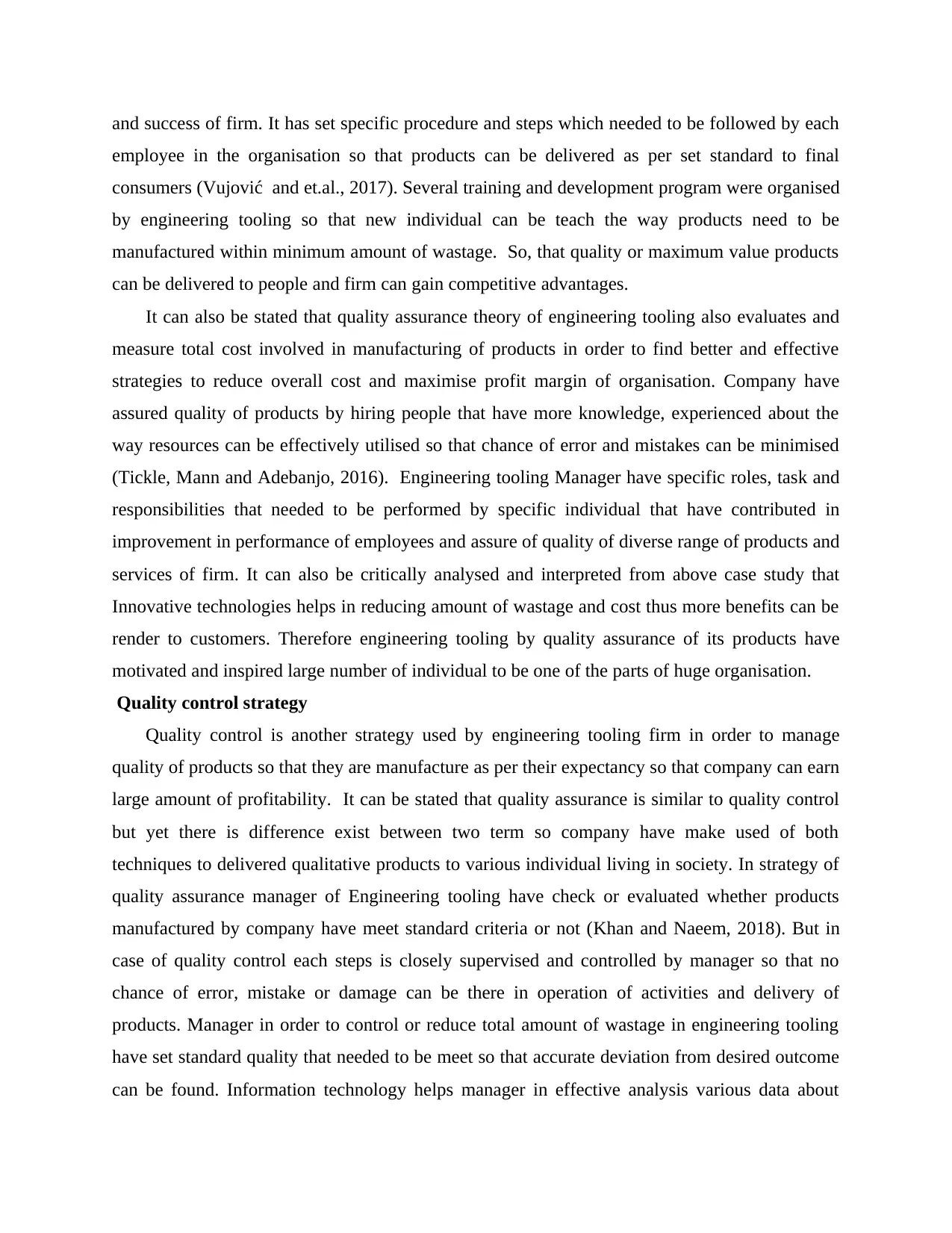
and success of firm. It has set specific procedure and steps which needed to be followed by each
employee in the organisation so that products can be delivered as per set standard to final
consumers (Vujović and et.al., 2017). Several training and development program were organised
by engineering tooling so that new individual can be teach the way products need to be
manufactured within minimum amount of wastage. So, that quality or maximum value products
can be delivered to people and firm can gain competitive advantages.
It can also be stated that quality assurance theory of engineering tooling also evaluates and
measure total cost involved in manufacturing of products in order to find better and effective
strategies to reduce overall cost and maximise profit margin of organisation. Company have
assured quality of products by hiring people that have more knowledge, experienced about the
way resources can be effectively utilised so that chance of error and mistakes can be minimised
(Tickle, Mann and Adebanjo, 2016). Engineering tooling Manager have specific roles, task and
responsibilities that needed to be performed by specific individual that have contributed in
improvement in performance of employees and assure of quality of diverse range of products and
services of firm. It can also be critically analysed and interpreted from above case study that
Innovative technologies helps in reducing amount of wastage and cost thus more benefits can be
render to customers. Therefore engineering tooling by quality assurance of its products have
motivated and inspired large number of individual to be one of the parts of huge organisation.
Quality control strategy
Quality control is another strategy used by engineering tooling firm in order to manage
quality of products so that they are manufacture as per their expectancy so that company can earn
large amount of profitability. It can be stated that quality assurance is similar to quality control
but yet there is difference exist between two term so company have make used of both
techniques to delivered qualitative products to various individual living in society. In strategy of
quality assurance manager of Engineering tooling have check or evaluated whether products
manufactured by company have meet standard criteria or not (Khan and Naeem, 2018). But in
case of quality control each steps is closely supervised and controlled by manager so that no
chance of error, mistake or damage can be there in operation of activities and delivery of
products. Manager in order to control or reduce total amount of wastage in engineering tooling
have set standard quality that needed to be meet so that accurate deviation from desired outcome
can be found. Information technology helps manager in effective analysis various data about
employee in the organisation so that products can be delivered as per set standard to final
consumers (Vujović and et.al., 2017). Several training and development program were organised
by engineering tooling so that new individual can be teach the way products need to be
manufactured within minimum amount of wastage. So, that quality or maximum value products
can be delivered to people and firm can gain competitive advantages.
It can also be stated that quality assurance theory of engineering tooling also evaluates and
measure total cost involved in manufacturing of products in order to find better and effective
strategies to reduce overall cost and maximise profit margin of organisation. Company have
assured quality of products by hiring people that have more knowledge, experienced about the
way resources can be effectively utilised so that chance of error and mistakes can be minimised
(Tickle, Mann and Adebanjo, 2016). Engineering tooling Manager have specific roles, task and
responsibilities that needed to be performed by specific individual that have contributed in
improvement in performance of employees and assure of quality of diverse range of products and
services of firm. It can also be critically analysed and interpreted from above case study that
Innovative technologies helps in reducing amount of wastage and cost thus more benefits can be
render to customers. Therefore engineering tooling by quality assurance of its products have
motivated and inspired large number of individual to be one of the parts of huge organisation.
Quality control strategy
Quality control is another strategy used by engineering tooling firm in order to manage
quality of products so that they are manufacture as per their expectancy so that company can earn
large amount of profitability. It can be stated that quality assurance is similar to quality control
but yet there is difference exist between two term so company have make used of both
techniques to delivered qualitative products to various individual living in society. In strategy of
quality assurance manager of Engineering tooling have check or evaluated whether products
manufactured by company have meet standard criteria or not (Khan and Naeem, 2018). But in
case of quality control each steps is closely supervised and controlled by manager so that no
chance of error, mistake or damage can be there in operation of activities and delivery of
products. Manager in order to control or reduce total amount of wastage in engineering tooling
have set standard quality that needed to be meet so that accurate deviation from desired outcome
can be found. Information technology helps manager in effective analysis various data about
⊘ This is a preview!⊘
Do you want full access?
Subscribe today to unlock all pages.

Trusted by 1+ million students worldwide
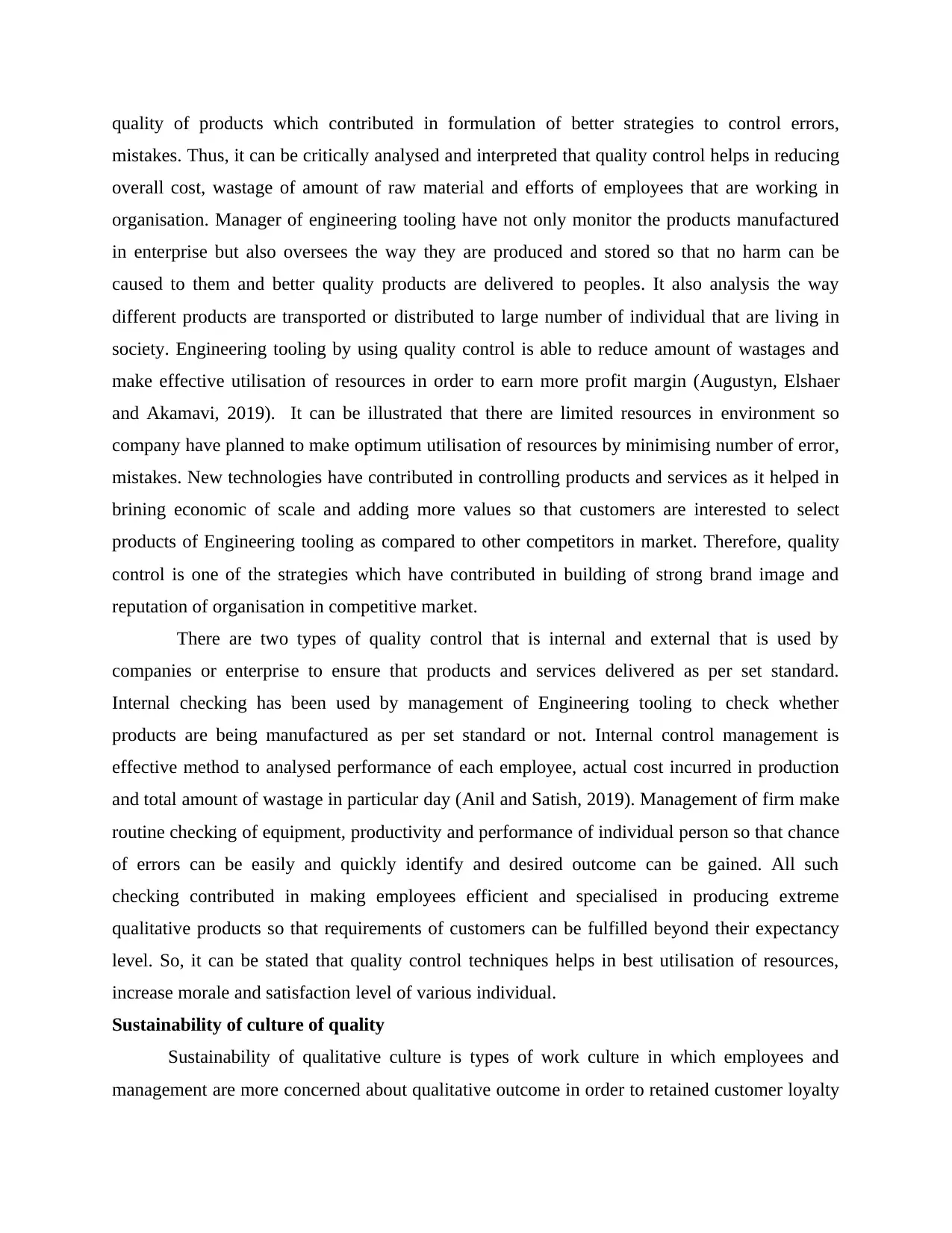
quality of products which contributed in formulation of better strategies to control errors,
mistakes. Thus, it can be critically analysed and interpreted that quality control helps in reducing
overall cost, wastage of amount of raw material and efforts of employees that are working in
organisation. Manager of engineering tooling have not only monitor the products manufactured
in enterprise but also oversees the way they are produced and stored so that no harm can be
caused to them and better quality products are delivered to peoples. It also analysis the way
different products are transported or distributed to large number of individual that are living in
society. Engineering tooling by using quality control is able to reduce amount of wastages and
make effective utilisation of resources in order to earn more profit margin (Augustyn, Elshaer
and Akamavi, 2019). It can be illustrated that there are limited resources in environment so
company have planned to make optimum utilisation of resources by minimising number of error,
mistakes. New technologies have contributed in controlling products and services as it helped in
brining economic of scale and adding more values so that customers are interested to select
products of Engineering tooling as compared to other competitors in market. Therefore, quality
control is one of the strategies which have contributed in building of strong brand image and
reputation of organisation in competitive market.
There are two types of quality control that is internal and external that is used by
companies or enterprise to ensure that products and services delivered as per set standard.
Internal checking has been used by management of Engineering tooling to check whether
products are being manufactured as per set standard or not. Internal control management is
effective method to analysed performance of each employee, actual cost incurred in production
and total amount of wastage in particular day (Anil and Satish, 2019). Management of firm make
routine checking of equipment, productivity and performance of individual person so that chance
of errors can be easily and quickly identify and desired outcome can be gained. All such
checking contributed in making employees efficient and specialised in producing extreme
qualitative products so that requirements of customers can be fulfilled beyond their expectancy
level. So, it can be stated that quality control techniques helps in best utilisation of resources,
increase morale and satisfaction level of various individual.
Sustainability of culture of quality
Sustainability of qualitative culture is types of work culture in which employees and
management are more concerned about qualitative outcome in order to retained customer loyalty
mistakes. Thus, it can be critically analysed and interpreted that quality control helps in reducing
overall cost, wastage of amount of raw material and efforts of employees that are working in
organisation. Manager of engineering tooling have not only monitor the products manufactured
in enterprise but also oversees the way they are produced and stored so that no harm can be
caused to them and better quality products are delivered to peoples. It also analysis the way
different products are transported or distributed to large number of individual that are living in
society. Engineering tooling by using quality control is able to reduce amount of wastages and
make effective utilisation of resources in order to earn more profit margin (Augustyn, Elshaer
and Akamavi, 2019). It can be illustrated that there are limited resources in environment so
company have planned to make optimum utilisation of resources by minimising number of error,
mistakes. New technologies have contributed in controlling products and services as it helped in
brining economic of scale and adding more values so that customers are interested to select
products of Engineering tooling as compared to other competitors in market. Therefore, quality
control is one of the strategies which have contributed in building of strong brand image and
reputation of organisation in competitive market.
There are two types of quality control that is internal and external that is used by
companies or enterprise to ensure that products and services delivered as per set standard.
Internal checking has been used by management of Engineering tooling to check whether
products are being manufactured as per set standard or not. Internal control management is
effective method to analysed performance of each employee, actual cost incurred in production
and total amount of wastage in particular day (Anil and Satish, 2019). Management of firm make
routine checking of equipment, productivity and performance of individual person so that chance
of errors can be easily and quickly identify and desired outcome can be gained. All such
checking contributed in making employees efficient and specialised in producing extreme
qualitative products so that requirements of customers can be fulfilled beyond their expectancy
level. So, it can be stated that quality control techniques helps in best utilisation of resources,
increase morale and satisfaction level of various individual.
Sustainability of culture of quality
Sustainability of qualitative culture is types of work culture in which employees and
management are more concerned about qualitative outcome in order to retained customer loyalty
Paraphrase This Document
Need a fresh take? Get an instant paraphrase of this document with our AI Paraphraser
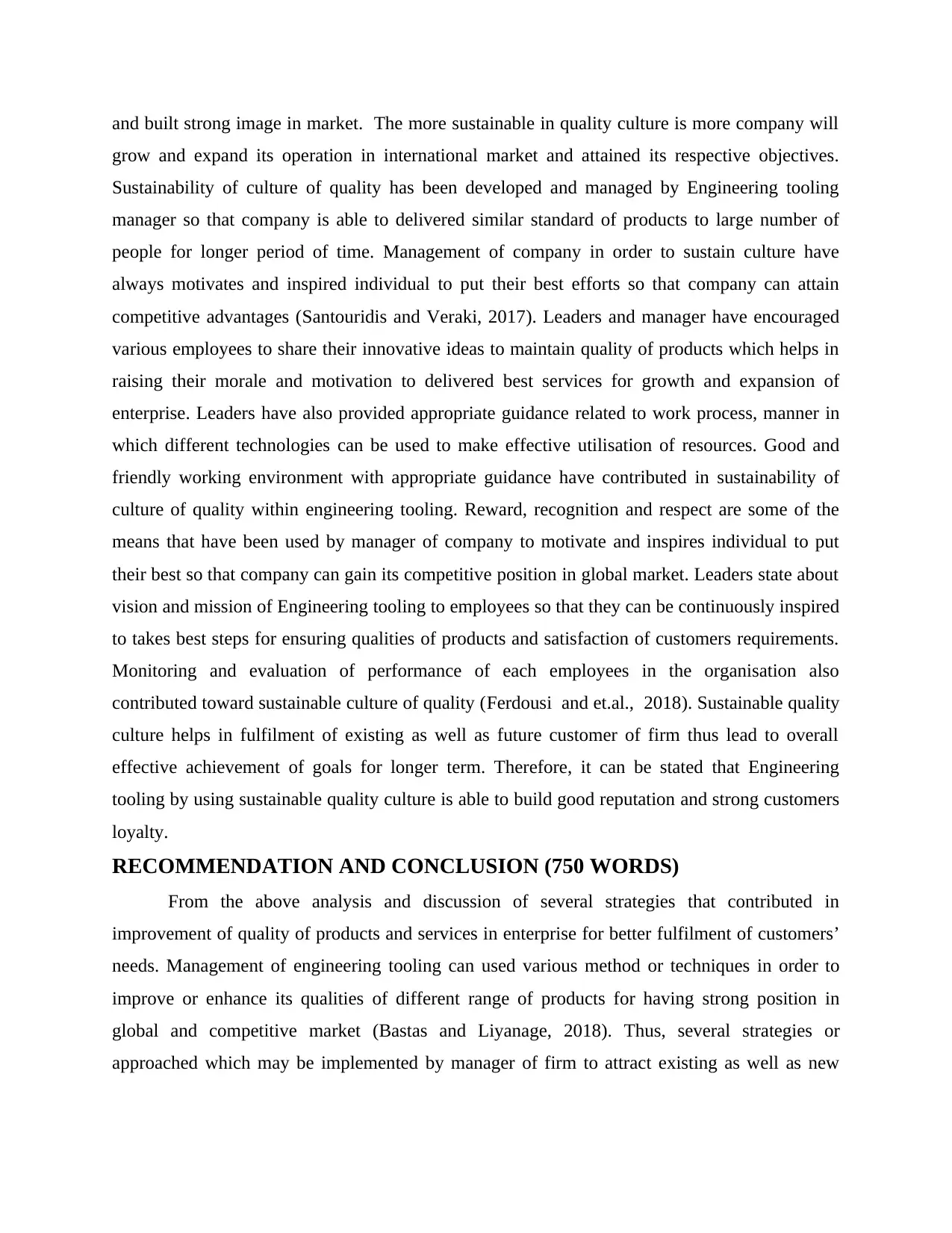
and built strong image in market. The more sustainable in quality culture is more company will
grow and expand its operation in international market and attained its respective objectives.
Sustainability of culture of quality has been developed and managed by Engineering tooling
manager so that company is able to delivered similar standard of products to large number of
people for longer period of time. Management of company in order to sustain culture have
always motivates and inspired individual to put their best efforts so that company can attain
competitive advantages (Santouridis and Veraki, 2017). Leaders and manager have encouraged
various employees to share their innovative ideas to maintain quality of products which helps in
raising their morale and motivation to delivered best services for growth and expansion of
enterprise. Leaders have also provided appropriate guidance related to work process, manner in
which different technologies can be used to make effective utilisation of resources. Good and
friendly working environment with appropriate guidance have contributed in sustainability of
culture of quality within engineering tooling. Reward, recognition and respect are some of the
means that have been used by manager of company to motivate and inspires individual to put
their best so that company can gain its competitive position in global market. Leaders state about
vision and mission of Engineering tooling to employees so that they can be continuously inspired
to takes best steps for ensuring qualities of products and satisfaction of customers requirements.
Monitoring and evaluation of performance of each employees in the organisation also
contributed toward sustainable culture of quality (Ferdousi and et.al., 2018). Sustainable quality
culture helps in fulfilment of existing as well as future customer of firm thus lead to overall
effective achievement of goals for longer term. Therefore, it can be stated that Engineering
tooling by using sustainable quality culture is able to build good reputation and strong customers
loyalty.
RECOMMENDATION AND CONCLUSION (750 WORDS)
From the above analysis and discussion of several strategies that contributed in
improvement of quality of products and services in enterprise for better fulfilment of customers’
needs. Management of engineering tooling can used various method or techniques in order to
improve or enhance its qualities of different range of products for having strong position in
global and competitive market (Bastas and Liyanage, 2018). Thus, several strategies or
approached which may be implemented by manager of firm to attract existing as well as new
grow and expand its operation in international market and attained its respective objectives.
Sustainability of culture of quality has been developed and managed by Engineering tooling
manager so that company is able to delivered similar standard of products to large number of
people for longer period of time. Management of company in order to sustain culture have
always motivates and inspired individual to put their best efforts so that company can attain
competitive advantages (Santouridis and Veraki, 2017). Leaders and manager have encouraged
various employees to share their innovative ideas to maintain quality of products which helps in
raising their morale and motivation to delivered best services for growth and expansion of
enterprise. Leaders have also provided appropriate guidance related to work process, manner in
which different technologies can be used to make effective utilisation of resources. Good and
friendly working environment with appropriate guidance have contributed in sustainability of
culture of quality within engineering tooling. Reward, recognition and respect are some of the
means that have been used by manager of company to motivate and inspires individual to put
their best so that company can gain its competitive position in global market. Leaders state about
vision and mission of Engineering tooling to employees so that they can be continuously inspired
to takes best steps for ensuring qualities of products and satisfaction of customers requirements.
Monitoring and evaluation of performance of each employees in the organisation also
contributed toward sustainable culture of quality (Ferdousi and et.al., 2018). Sustainable quality
culture helps in fulfilment of existing as well as future customer of firm thus lead to overall
effective achievement of goals for longer term. Therefore, it can be stated that Engineering
tooling by using sustainable quality culture is able to build good reputation and strong customers
loyalty.
RECOMMENDATION AND CONCLUSION (750 WORDS)
From the above analysis and discussion of several strategies that contributed in
improvement of quality of products and services in enterprise for better fulfilment of customers’
needs. Management of engineering tooling can used various method or techniques in order to
improve or enhance its qualities of different range of products for having strong position in
global and competitive market (Bastas and Liyanage, 2018). Thus, several strategies or
approached which may be implemented by manager of firm to attract existing as well as new
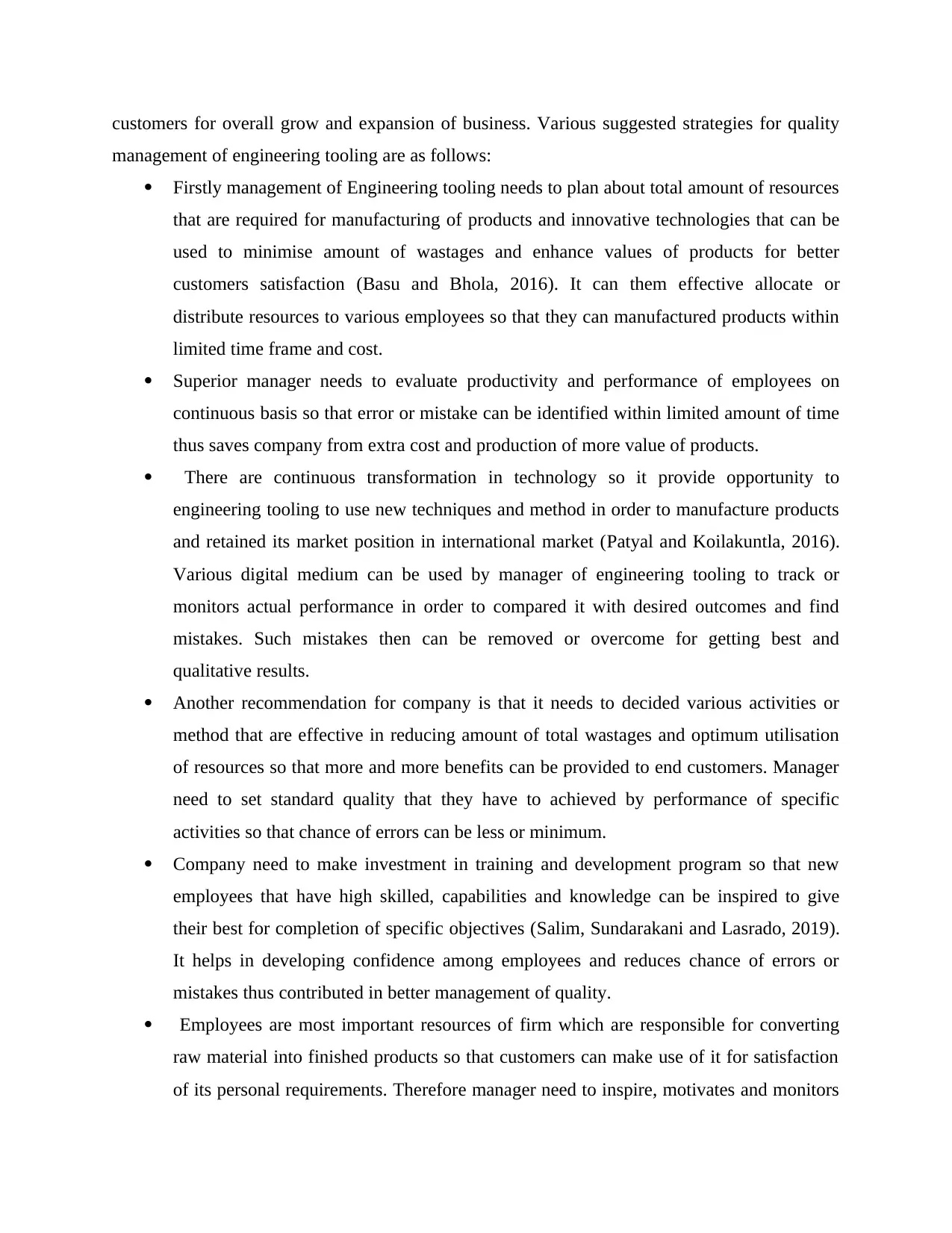
customers for overall grow and expansion of business. Various suggested strategies for quality
management of engineering tooling are as follows:
Firstly management of Engineering tooling needs to plan about total amount of resources
that are required for manufacturing of products and innovative technologies that can be
used to minimise amount of wastages and enhance values of products for better
customers satisfaction (Basu and Bhola, 2016). It can them effective allocate or
distribute resources to various employees so that they can manufactured products within
limited time frame and cost.
Superior manager needs to evaluate productivity and performance of employees on
continuous basis so that error or mistake can be identified within limited amount of time
thus saves company from extra cost and production of more value of products.
There are continuous transformation in technology so it provide opportunity to
engineering tooling to use new techniques and method in order to manufacture products
and retained its market position in international market (Patyal and Koilakuntla, 2016).
Various digital medium can be used by manager of engineering tooling to track or
monitors actual performance in order to compared it with desired outcomes and find
mistakes. Such mistakes then can be removed or overcome for getting best and
qualitative results.
Another recommendation for company is that it needs to decided various activities or
method that are effective in reducing amount of total wastages and optimum utilisation
of resources so that more and more benefits can be provided to end customers. Manager
need to set standard quality that they have to achieved by performance of specific
activities so that chance of errors can be less or minimum.
Company need to make investment in training and development program so that new
employees that have high skilled, capabilities and knowledge can be inspired to give
their best for completion of specific objectives (Salim, Sundarakani and Lasrado, 2019).
It helps in developing confidence among employees and reduces chance of errors or
mistakes thus contributed in better management of quality.
Employees are most important resources of firm which are responsible for converting
raw material into finished products so that customers can make use of it for satisfaction
of its personal requirements. Therefore manager need to inspire, motivates and monitors
management of engineering tooling are as follows:
Firstly management of Engineering tooling needs to plan about total amount of resources
that are required for manufacturing of products and innovative technologies that can be
used to minimise amount of wastages and enhance values of products for better
customers satisfaction (Basu and Bhola, 2016). It can them effective allocate or
distribute resources to various employees so that they can manufactured products within
limited time frame and cost.
Superior manager needs to evaluate productivity and performance of employees on
continuous basis so that error or mistake can be identified within limited amount of time
thus saves company from extra cost and production of more value of products.
There are continuous transformation in technology so it provide opportunity to
engineering tooling to use new techniques and method in order to manufacture products
and retained its market position in international market (Patyal and Koilakuntla, 2016).
Various digital medium can be used by manager of engineering tooling to track or
monitors actual performance in order to compared it with desired outcomes and find
mistakes. Such mistakes then can be removed or overcome for getting best and
qualitative results.
Another recommendation for company is that it needs to decided various activities or
method that are effective in reducing amount of total wastages and optimum utilisation
of resources so that more and more benefits can be provided to end customers. Manager
need to set standard quality that they have to achieved by performance of specific
activities so that chance of errors can be less or minimum.
Company need to make investment in training and development program so that new
employees that have high skilled, capabilities and knowledge can be inspired to give
their best for completion of specific objectives (Salim, Sundarakani and Lasrado, 2019).
It helps in developing confidence among employees and reduces chance of errors or
mistakes thus contributed in better management of quality.
Employees are most important resources of firm which are responsible for converting
raw material into finished products so that customers can make use of it for satisfaction
of its personal requirements. Therefore manager need to inspire, motivates and monitors
⊘ This is a preview!⊘
Do you want full access?
Subscribe today to unlock all pages.

Trusted by 1+ million students worldwide
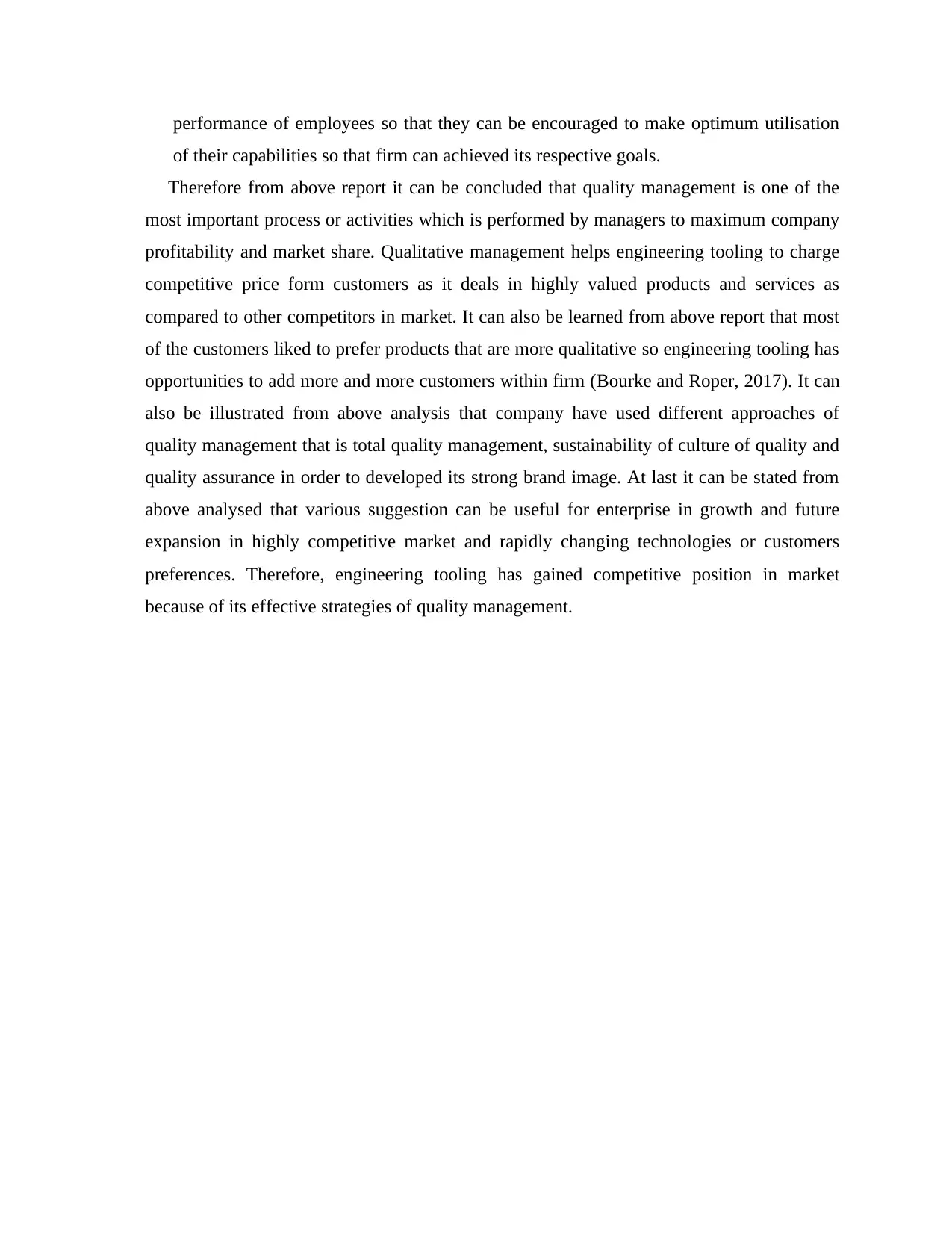
performance of employees so that they can be encouraged to make optimum utilisation
of their capabilities so that firm can achieved its respective goals.
Therefore from above report it can be concluded that quality management is one of the
most important process or activities which is performed by managers to maximum company
profitability and market share. Qualitative management helps engineering tooling to charge
competitive price form customers as it deals in highly valued products and services as
compared to other competitors in market. It can also be learned from above report that most
of the customers liked to prefer products that are more qualitative so engineering tooling has
opportunities to add more and more customers within firm (Bourke and Roper, 2017). It can
also be illustrated from above analysis that company have used different approaches of
quality management that is total quality management, sustainability of culture of quality and
quality assurance in order to developed its strong brand image. At last it can be stated from
above analysed that various suggestion can be useful for enterprise in growth and future
expansion in highly competitive market and rapidly changing technologies or customers
preferences. Therefore, engineering tooling has gained competitive position in market
because of its effective strategies of quality management.
of their capabilities so that firm can achieved its respective goals.
Therefore from above report it can be concluded that quality management is one of the
most important process or activities which is performed by managers to maximum company
profitability and market share. Qualitative management helps engineering tooling to charge
competitive price form customers as it deals in highly valued products and services as
compared to other competitors in market. It can also be learned from above report that most
of the customers liked to prefer products that are more qualitative so engineering tooling has
opportunities to add more and more customers within firm (Bourke and Roper, 2017). It can
also be illustrated from above analysis that company have used different approaches of
quality management that is total quality management, sustainability of culture of quality and
quality assurance in order to developed its strong brand image. At last it can be stated from
above analysed that various suggestion can be useful for enterprise in growth and future
expansion in highly competitive market and rapidly changing technologies or customers
preferences. Therefore, engineering tooling has gained competitive position in market
because of its effective strategies of quality management.
Paraphrase This Document
Need a fresh take? Get an instant paraphrase of this document with our AI Paraphraser
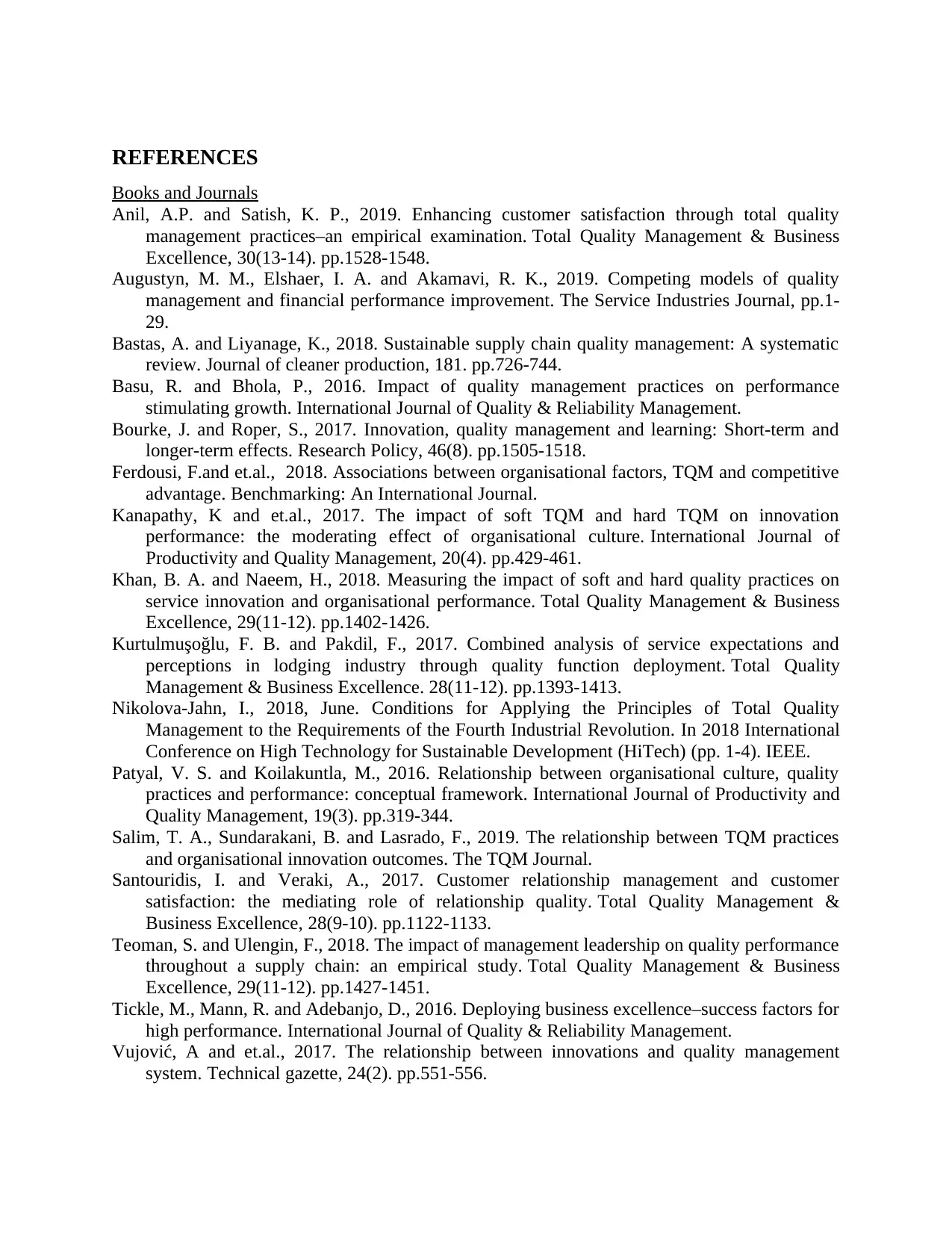
REFERENCES
Books and Journals
Anil, A.P. and Satish, K. P., 2019. Enhancing customer satisfaction through total quality
management practices–an empirical examination. Total Quality Management & Business
Excellence, 30(13-14). pp.1528-1548.
Augustyn, M. M., Elshaer, I. A. and Akamavi, R. K., 2019. Competing models of quality
management and financial performance improvement. The Service Industries Journal, pp.1-
29.
Bastas, A. and Liyanage, K., 2018. Sustainable supply chain quality management: A systematic
review. Journal of cleaner production, 181. pp.726-744.
Basu, R. and Bhola, P., 2016. Impact of quality management practices on performance
stimulating growth. International Journal of Quality & Reliability Management.
Bourke, J. and Roper, S., 2017. Innovation, quality management and learning: Short-term and
longer-term effects. Research Policy, 46(8). pp.1505-1518.
Ferdousi, F.and et.al., 2018. Associations between organisational factors, TQM and competitive
advantage. Benchmarking: An International Journal.
Kanapathy, K and et.al., 2017. The impact of soft TQM and hard TQM on innovation
performance: the moderating effect of organisational culture. International Journal of
Productivity and Quality Management, 20(4). pp.429-461.
Khan, B. A. and Naeem, H., 2018. Measuring the impact of soft and hard quality practices on
service innovation and organisational performance. Total Quality Management & Business
Excellence, 29(11-12). pp.1402-1426.
Kurtulmuşoğlu, F. B. and Pakdil, F., 2017. Combined analysis of service expectations and
perceptions in lodging industry through quality function deployment. Total Quality
Management & Business Excellence. 28(11-12). pp.1393-1413.
Nikolova-Jahn, I., 2018, June. Conditions for Applying the Principles of Total Quality
Management to the Requirements of the Fourth Industrial Revolution. In 2018 International
Conference on High Technology for Sustainable Development (HiTech) (pp. 1-4). IEEE.
Patyal, V. S. and Koilakuntla, M., 2016. Relationship between organisational culture, quality
practices and performance: conceptual framework. International Journal of Productivity and
Quality Management, 19(3). pp.319-344.
Salim, T. A., Sundarakani, B. and Lasrado, F., 2019. The relationship between TQM practices
and organisational innovation outcomes. The TQM Journal.
Santouridis, I. and Veraki, A., 2017. Customer relationship management and customer
satisfaction: the mediating role of relationship quality. Total Quality Management &
Business Excellence, 28(9-10). pp.1122-1133.
Teoman, S. and Ulengin, F., 2018. The impact of management leadership on quality performance
throughout a supply chain: an empirical study. Total Quality Management & Business
Excellence, 29(11-12). pp.1427-1451.
Tickle, M., Mann, R. and Adebanjo, D., 2016. Deploying business excellence–success factors for
high performance. International Journal of Quality & Reliability Management.
Vujović, A and et.al., 2017. The relationship between innovations and quality management
system. Technical gazette, 24(2). pp.551-556.
Books and Journals
Anil, A.P. and Satish, K. P., 2019. Enhancing customer satisfaction through total quality
management practices–an empirical examination. Total Quality Management & Business
Excellence, 30(13-14). pp.1528-1548.
Augustyn, M. M., Elshaer, I. A. and Akamavi, R. K., 2019. Competing models of quality
management and financial performance improvement. The Service Industries Journal, pp.1-
29.
Bastas, A. and Liyanage, K., 2018. Sustainable supply chain quality management: A systematic
review. Journal of cleaner production, 181. pp.726-744.
Basu, R. and Bhola, P., 2016. Impact of quality management practices on performance
stimulating growth. International Journal of Quality & Reliability Management.
Bourke, J. and Roper, S., 2017. Innovation, quality management and learning: Short-term and
longer-term effects. Research Policy, 46(8). pp.1505-1518.
Ferdousi, F.and et.al., 2018. Associations between organisational factors, TQM and competitive
advantage. Benchmarking: An International Journal.
Kanapathy, K and et.al., 2017. The impact of soft TQM and hard TQM on innovation
performance: the moderating effect of organisational culture. International Journal of
Productivity and Quality Management, 20(4). pp.429-461.
Khan, B. A. and Naeem, H., 2018. Measuring the impact of soft and hard quality practices on
service innovation and organisational performance. Total Quality Management & Business
Excellence, 29(11-12). pp.1402-1426.
Kurtulmuşoğlu, F. B. and Pakdil, F., 2017. Combined analysis of service expectations and
perceptions in lodging industry through quality function deployment. Total Quality
Management & Business Excellence. 28(11-12). pp.1393-1413.
Nikolova-Jahn, I., 2018, June. Conditions for Applying the Principles of Total Quality
Management to the Requirements of the Fourth Industrial Revolution. In 2018 International
Conference on High Technology for Sustainable Development (HiTech) (pp. 1-4). IEEE.
Patyal, V. S. and Koilakuntla, M., 2016. Relationship between organisational culture, quality
practices and performance: conceptual framework. International Journal of Productivity and
Quality Management, 19(3). pp.319-344.
Salim, T. A., Sundarakani, B. and Lasrado, F., 2019. The relationship between TQM practices
and organisational innovation outcomes. The TQM Journal.
Santouridis, I. and Veraki, A., 2017. Customer relationship management and customer
satisfaction: the mediating role of relationship quality. Total Quality Management &
Business Excellence, 28(9-10). pp.1122-1133.
Teoman, S. and Ulengin, F., 2018. The impact of management leadership on quality performance
throughout a supply chain: an empirical study. Total Quality Management & Business
Excellence, 29(11-12). pp.1427-1451.
Tickle, M., Mann, R. and Adebanjo, D., 2016. Deploying business excellence–success factors for
high performance. International Journal of Quality & Reliability Management.
Vujović, A and et.al., 2017. The relationship between innovations and quality management
system. Technical gazette, 24(2). pp.551-556.
1 out of 11
Related Documents
Your All-in-One AI-Powered Toolkit for Academic Success.
+13062052269
info@desklib.com
Available 24*7 on WhatsApp / Email
![[object Object]](/_next/static/media/star-bottom.7253800d.svg)
Unlock your academic potential
Copyright © 2020–2026 A2Z Services. All Rights Reserved. Developed and managed by ZUCOL.





